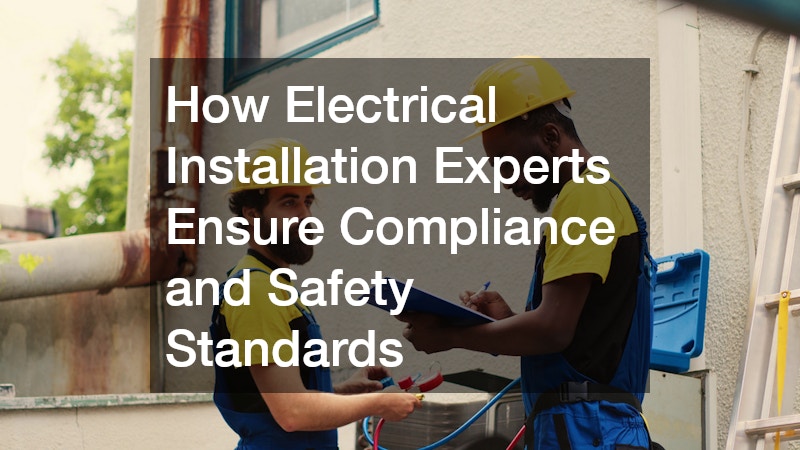In the realm of electrical installations, ensuring compliance and upholding safety standards are two of the most critical responsibilities assigned to experts in the field. From residential wiring to large-scale industrial systems, electrical installation experts serve as the first line of defence against hazards such as fires, electrocution, and costly equipment failures. Their expertise not only ensures that electrical systems function properly but also that they meet stringent legal and regulatory requirements.
With technological advancements and evolving building codes, the demand for skilled, up-to-date professionals has never been more important. This article delves into the crucial role these professionals play in maintaining safety and compliance in electrical installations, highlighting the standards they follow, the tools they use, and the qualifications they must maintain to keep both people and property protected.
What Are the Key Safety Standards Electrical Experts Must Follow?
Understanding the National Electrical Code (NEC)
The National Electrical Code (NEC) serves as a foundational safety standard, dictating guidelines that ensure safe electrical design, installation, and inspection to protect personnel and property. Professionals in the field are required to be intimately familiar with these guidelines in order to execute their tasks safely and effectively.
The NEC is updated every three years to reflect the latest safety considerations and technological advancements. For electrical experts, staying current with these updates is not just recommended; it is essential to their work.
Failure to comply with NEC regulations can lead to severe safety hazards, including fires, electrocution, and property damage. Therefore, understanding and implementing NEC standards is a top priority for electrical installation experts.
Role of OSHA in Electrical Safety
The Occupational Safety and Health Administration (OSHA) sets regulatory standards to minimize workplace hazards and strengthen safety practices. Electrical installation experts use OSHA guidelines to ensure that all safety measures are in place to protect workers.
OSHA also mandates regular training to equip workers with the knowledge to handle electrical equipment responsibly. This training is integral in preventing accidents and ensuring safe practices across all levels of any project.
In addition to setting rules, OSHA frequently conducts inspections to verify compliance in various workplace settings. Such inspections serve as a deterrent to negligence and reaffirm the importance of following established safety standards.
How Do Experts Ensure Compliance During Electrical Installations?
Conducting Comprehensive Inspections
Electrical installation experts perform thorough inspections to ensure adherence to all applicable codes and standards to maintain safety and functionality. These inspections are thorough assessments that evaluate every aspect of the electrical system from design to installation.
The inspections identify potential risks and errors that may violate safety regulations. Experts are trained to meticulously document findings and recommend corrective actions, thus preventing future incidents.
Regular inspections also allow for proactive maintenance, thereby prolonging the lifespan of electrical components. This proactive approach minimizes interruptions and provides a safeguard against future hazards.
Utilizing Advanced Technologies and Tools
Experts leverage state-of-the-art tools and technologies to ensure precision in installation and to facilitate compliance verification. These tools include digital multimeters, circuit testers, and increasingly sophisticated software for system diagnostics.
Such technologies not only expedite the installation process but also enhance the accuracy of inspections. By implementing advanced tools, electrical experts eliminate guesswork and ensure that installations are executed flawlessly.
The use of technology extends to documentation and planning, allowing for streamlined project management. By integrating technology at every stage, experts ensure both compliance and higher standards of safety.
What Training and Certifications Are Required for Electrical Installation Experts?
Essential Training Programs and Apprenticeships
Training programs and apprenticeships offer the foundational knowledge and hands-on experience necessary for becoming a certified electrical installation expert. These programs focus on delivering both theoretical and practical expertise in electrical systems.
Apprenticeships specifically provide invaluable, on-the-job experience, enabling trainees to apply their knowledge in real-world scenarios. By working under the supervision of seasoned professionals, apprentices hone their skills and gain industry insights.
Upon completing these programs, individuals often undergo certification exams. Passing these exams validates their proficiency, making them qualified and reliable experts in the field.
Importance of Continuous Education and Certification Renewal
Ongoing education and certification renewal are critical for professionals to stay abreast of evolving standards and technologies. As the electrical industry is subject to rapid technological advances, continuous learning is essential.
Many regulatory bodies mandate that certifications are renewed periodically. This ensures that experts remain compliant with the latest safety standards and technological innovations.
Continuous education also provides experts with opportunities to specialize in various facets of electrical work, broadening their expertise. Staying informed about industry trends enables electrical professionals to offer more comprehensive services.
Electrical installation experts are much more than skilled tradespeople—they are vital stewards of safety and compliance in an increasingly electrified world. Their in-depth understanding of codes like the NEC, adherence to OSHA guidelines, use of advanced diagnostic tools, and commitment to lifelong learning all contribute to the seamless and secure operation of electrical systems across various sectors. Without their attention to detail and rigorous adherence to safety protocols, modern infrastructure would face heightened risk and liability. For property owners, builders, and business leaders alike, partnering with certified and continuously trained professionals is not just a regulatory necessity—it’s a critical investment in safety, performance, and peace of mind. As the industry evolves, the role of these experts will only become more central in shaping a reliable and future-ready electrical landscape.

